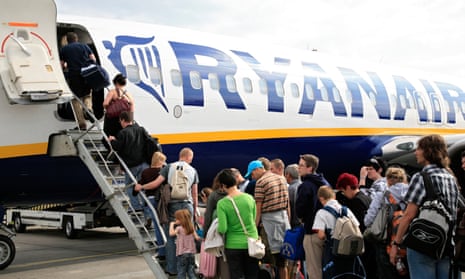Ryanair has applied for a British air operating licence to ensure its domestic UK routes can keep flying after Brexit.
The Irish airline has repeatedly warned that flights could be grounded after March 2019 unless a new framework for aviation is agreed between Britain and the EU.
A British licence would guarantee the airline could continue to operate routes between London, Northern Irish and Scottish airports, as it could otherwise be classified as a “foreign” airline in the UK after Brexit.
Ryanair filed for a licence just before Christmas using a new UK subsidiary, after a similar move in October from the Hungarian budget airline Wizz Air, which wants to expand operations at its base in Luton.
The airline said in a statement on Tuesday: “A subsidiary company, Ryanair UK, filed an application on 21 December for an air operator’s certificate with the Civil Aviation Authority in the UK. This may be required for Ryanair’s three UK domestic routes in the event of a hard Brexit in March 2019.”
Ryanair’s rival, easyJet, made a similar move in the other direction last year by opening a new headquarters in Vienna for easyJet Europe, allowing it to continue operating intra-EU flights.
While ministers have insisted that negotiating a liberal arrangement for aviation after Brexit is a priority, airlines have been pessimistic over the prospects of retaining current freedoms to fly domestic routes.
Flying rights are currently governed by EU-wide deals, and the aviation sector has no natural fallback arrangement to protect them without a deal.
EasyJet’s move to establish a separate subsidiary cost it about £10m, and Ryanair had indicated reluctance to spend any comparable sum preserving its minor domestic routes in Britain, saying last year it was still considering whether to simply axe the routes. Many flights between Scotland and Stansted were picked for cancellation during the recent pilot rostering fiasco.
Though flights between the UK and EU are major revenue earners, Ryanair’s internal UK routes account for about 2% of its business.
The airline said last year that it planned to pivot its growth away from Britain, warning that the lack of clarity over Brexit could cause disruption and affect demand. However, other airlines have dismissed the prospect of flights being stopped by Brexit.
